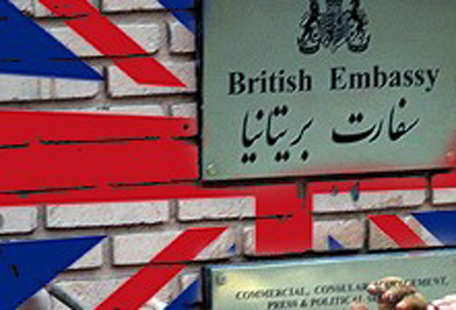No Hope for Significant Changes in Relations with the UK

Iran's on-and-off relations with the UK have been a hot topic in domestic and diplomatic debates, particularly after the disputed 2009 presidential election which ushered in months of protests by the Green supporters. Could London’s decision to send a new envoy to Tehran –amid renewed calls to retake the Qolhak Garden mansion in Tehran which is possessed by the British Embassy-bring a wind of change to the tense relations. Sharyar Sabet-Saeidi, British affairs analyst, regards this as an unlikely possibility:
IRD: Dominick John Chilcott has replaced Simon Gass has been appointed by British government as the country’s new ambassador to the Islamic Republic of Iran and handed Foreign Minister Ali-Akbar Salehi his credentials. Could this be interpreted as a step towards normalization of ties in Iran-Britain relations?
SS: Technically, we speak of ‘normalization’ when the two parties have been officially downgraded from the ambassadorial level. This is not what taken place in this case. After the post-election events, detention of eight UK embassy’s local staffs, allegations concerning London’s involvement in the unrests and Simon Gass’ position, there has been a sort of reluctance in both governments to appoint a new ambassador. The recent decision by the UK could be a sign of change. Downgrading relations is a sign of substantial differences, but that has not been seen in the current state of relations between Tehran and London. Britain has always preferred the policy of keeping open the communication channels to exchange viewpoints and to understand the other countries’ situation better. Although I see Britain’s decision and Iran’s reception of Chilcott as a positive measure, however lukewarm that may be, in the relations, but the overall situation suffers instability and no great changes can be expected.
IRD: How do you see Chilcott profile? Were there any special considerations prompting his appointment as the new British ambassador?
SS: In his diplomatic profile, there is UK’s representation in the EU and his service as deputy UK Ambassador to Washington. Seemingly these two factors have played a key role in his appointment, as the greatest challenge in the West-Iran relations is the nuclear issue; two key actors of the West are the US and the European Union and the experiences of the new ambassador can be useful in the future arrangements of Iran and Europe. It is also noteworthy that the deputyship of the UK ambassador to Washington is a very important position.
IRD: In his meeting with Mr. Salehi, Mr. Chilcott stated that he was assigned to transfer the realities if Iran, beyond the media viewpoint, to his government. Does it show any difference in attitude from Simon Gass?
SS: This could reflect a new approach -in which Gass did not believe, as his way of publicizing his critical assessment of Iran’s situation on the internet (in his Tweeter and his personal weblog) was not in accordance with diplomatic norms and disappointed Iran. Ambassadors are mainly committed to transfer information and materialize their respective government’s policies. Mr. Gass’ unusually radical criticisms were against the diplomatic practices and his substitution prevented further crisis. Chilcott’s arrival in Tehran highlights the importance of interaction with Iran, far and away from the media propaganda, especially the online propaganda.
IRD: While the US tends to intensify tension with Iran, is it possible that Iran’s relations with the EU -especially the UK- undergo détente, considering that Iran has shown inclination to do so?

